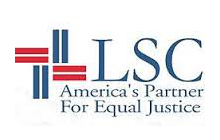Legal Services Corporation Survey Finds Major Impact of COVID-19 Pandemic on Legal Aid
 Legal services providers nationwide anticipate a spike in legal needs arising from COVID-19. The Legal Services Corporation (LSC) conducted a survey studying the COVID-19 pandemic’s effects on legal aid organizations and low-income Americans seeking legal help. The data was collected from June 15-23 from 129 legal services organizations that receive funding from LSC.
Legal services providers nationwide anticipate a spike in legal needs arising from COVID-19. The Legal Services Corporation (LSC) conducted a survey studying the COVID-19 pandemic’s effects on legal aid organizations and low-income Americans seeking legal help. The data was collected from June 15-23 from 129 legal services organizations that receive funding from LSC.
The survey found that the need for civil legal aid is immense. The vast majority (97%) of LSC grantees anticipate a sharp increase in legal needs arising from COVID-19 in the areas of eviction, foreclosures, unemployment assistance and appeals, consumer debt and income maintenance.
“The survey responses confirm that the pandemic and its economic consequences are causing or will cause a spike in legal needs in areas such as evictions, unemployment claims, and domestic violence,” said LSC President Ronald S. Flagg. “America’s legal aid programs are responding innovatively to meet those needs while providing their services remotely and while facing state and local funding cuts.”
Some LSC-funded grantees are already experiencing a dramatic rise in demand. Kentucky Legal Aid reports that the number of unemployment claims filed since the start of the COVID-19 crisis is 3,471% higher than last year. Southeast Louisiana Legal Services has seen a 670% increase in requests for legal help with unemployment issues and an almost 200% increase in evictions.
Ninety-four percent of grantees surveyed said that they are seeing clients who are newly eligible for LSC-funded legal aid. On average, grantees are reporting a 17.9% increase in the number of eligible clients due to the pandemic.
The survey found that all LSC grantees are continuing to provide legal services amid the current pandemic; 239 grantee offices are open to the public and 755 offices are providing services remotely. Nearly all grantees (95%) reported that clients have been requesting assistance with evictions, including illegal lockouts, utility shutoffs and foreclosures. The majority of grantees also reported that clients are struggling with issues of income maintenance, such as problems with stimulus checks, and unemployment benefits. Other key areas of need are domestic violence, general family law issues and consumer debt.
LSC submitted a request to Congress for $100 million in emergency funds to enable grantees to provide additional assistance as result of the pandemic. The CARES Act (enacted into law on March 27) included $50 million for LSC. In May, the House passed the HEROES Act which includes an additional $50 million for LSC; the Senate is discussing the next legislation to address the impact of COVID-19.
To learn more about LSC’s survey of legal aid organizations and see the full survey results, click here.